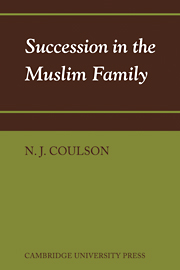Book contents
- Frontmatter
- Contents
- Introduction
- 1 Family ties as grounds of inheritance
- 2 Priorities in inheritance
- 3 Primary heirs
- 4 Substitute heirs
- 5 Secondary heirs
- 6 Grandfather and collaterals in competition
- 7 Succession by the outer family
- 8 Inheritance in Shīʻī law
- 9 Reforms in the traditional system of priorities
- 10 Dual relationships
- 11 Impediments to inheritance
- 12 Conditions of inheritance
- 13 Bequests
- 14 The limits of testamentary power
- 15 Death-sickness
- Index
- Frontmatter
- Contents
- Introduction
- 1 Family ties as grounds of inheritance
- 2 Priorities in inheritance
- 3 Primary heirs
- 4 Substitute heirs
- 5 Secondary heirs
- 6 Grandfather and collaterals in competition
- 7 Succession by the outer family
- 8 Inheritance in Shīʻī law
- 9 Reforms in the traditional system of priorities
- 10 Dual relationships
- 11 Impediments to inheritance
- 12 Conditions of inheritance
- 13 Bequests
- 14 The limits of testamentary power
- 15 Death-sickness
- Index
Summary
The coincidence of both a paternal and a maternal connection between relatives is a not uncommon feature of Islamic society. It arises from a variety of factors – from the institution of polygamy, the frequency of divorce and remarriage of divorcees, and particularly, in the context of traditional society, from marriages within the closely knit family group. Lines of paternal and maternal relatives may be linked, for example, by the marriage of cousins, or the marriage of a woman with the brother of her former husband, or the marriage of a man with the stepdaughter of his mother or his father. Succession law is therefore naturally concerned to regulate the effect of such a dual relationship with the praepositus, which may occur either in a relative of the inner family or, in an inevitably greater number of instances, in a relative of the outer family.
The rule of succession in a dual role
The basic principle, common to all versions of Sharīʿa law, is that each aspect of a dual relationship constitutes a separate and individual title for the purposes of succession. The relative concerned may therefore succeed under both titles in appropriate circumstances – i.e. where he or she is not excluded in one title by the other title or by other heirs competing.
Because of the fundamentally different rules of priority obtaining under Sunnī and Shīʿī law, the effect of the application of this basic principle varies in the two systems.
- Type
- Chapter
- Information
- Succession in the Muslim Family , pp. 164 - 171Publisher: Cambridge University PressPrint publication year: 1971



